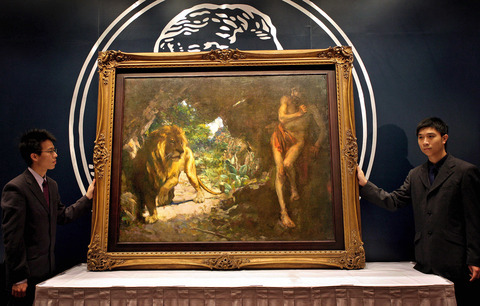An unknown collector forked out HK$53.8 million (US$6.92 million) yesterday for a 1920s painting by a renowned Chinese artist, setting a new record price for Chinese oil paintings.
The price for Slave and Lion by Xu Beihong (
The seller was an unnamed Singapore collector and the auction house declined to provide information about the buyer.

PHOTO: AFP
The price exceeded the previous set by Taiwanese artist Chen Chengbo's (
Another of Xu's oil paintings, Silly Old Man Moves a Mountain, was sold in Beijing five months ago for 30 million yuan (US$3.82 million).
The latest record-breaking paint-ing demonstrated Xu's technique of combining a Western sense of form and Chinese line of drawing.
It was one of the very few works Xu created during his stay in Berlin in the early 1920s, Christie's said.
Slave and Lion, from 1924, depicts a story of a slave and a lion in Europe. The slave, Androcles, who had helped a lion with a thorn in its paw, later ran into the same lion in a cruel human-animal battle staged in a Roman theater. The emperor was moved by the reunion and freed the slave.
The auction yesterday included about 2,500 classical and modern paintings, luxury watches, jewelry and ceramics, most of which came from the region.
Competition was keen for some of the other notable works on offer at the 20th Century Chinese Art Sale. These included Potted Chrysanthemum in a Blue and White Jardiniere by Sanyu (

Merida Industry Co (美利達) has seen signs of recovery in the US and European markets this year, as customers are gradually depleting their inventories, the bicycle maker told shareholders yesterday. Given robust growth in new orders at its Taiwanese factory, coupled with its subsidiaries’ improving performance, Merida said it remains confident about the bicycle market’s prospects and expects steady growth in its core business this year. CAUTION ON CHINA However, the company must handle the Chinese market with great caution, as sales of road bikes there have declined significantly, affecting its revenue and profitability, Merida said in a statement, adding that it would

MARKET LEADERSHIP: Investors are flocking to Nvidia, drawn by the company’s long-term fundamntals, dominant position in the AI sector, and pricing and margin power Two years after Nvidia Corp made history by becoming the first chipmaker to achieve a US$1 trillion market capitalization, an even more remarkable milestone is within its grasp: becoming the first company to reach US$4 trillion. After the emergence of China’s DeepSeek (深度求索) sent the stock plunging earlier this year and stoked concerns that outlays on artificial intelligence (AI) infrastructure were set to slow, Nvidia shares have rallied back to a record. The company’s biggest customers remain full steam ahead on spending, much of which is flowing to its computing systems. Microsoft Corp, Meta Platforms Inc, Amazon.com Inc and Alphabet Inc are

RISING: Strong exports, and life insurance companies’ efforts to manage currency risks indicates the NT dollar would eventually pass the 29 level, an expert said The New Taiwan dollar yesterday rallied to its strongest in three years amid inflows to the nation’s stock market and broad-based weakness in the US dollar. Exporter sales of the US currency and a repatriation of funds from local asset managers also played a role, said two traders, who asked not to be identified as they were not authorized to speak publicly. State-owned banks were seen buying the greenback yesterday, but only at a moderate scale, the traders said. The local currency gained 0.77 percent, outperforming almost all of its Asian peers, to close at NT$29.165 per US dollar in Taipei trading yesterday. The

The US overtaking China as Taiwan’s top export destination could boost industrial development and wage growth, given the US is a high-income economy, an economist said yesterday. However, Taiwan still needs to diversify its export markets due to the unpredictability of US President Donald Trump’s administration, said Chiou Jiunn-rong (邱俊榮), an economics professor at National Central University. Taiwan’s exports soared to a record US$51.74 billion last month, driven by strong demand for artificial intelligence (AI) products and continued orders, with information and communication technology (ICT) and audio/video products leading all sectors. The US reclaimed its position as Taiwan’s top export market, accounting for